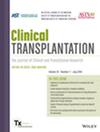Rethinking the Diagnosis and Management of Antibody-Mediated Rejection in Multidisciplinary Transplant Meetings: A Global Survey and Banff Working Group Recommendations
Abstract
Introduction
The diagnosis of antibody-mediated rejection (AMR) requires input from several transplant professionals. Bringing clinical and laboratory experts together may help standardize care. Yet, little is known about current global practices of multidisciplinary meetings for AMR management.
Methods
The Banff Antibody-Mediated Injury Working Group approached professional societies worldwide to distribute a survey on the availability, content, participants, perceived value, and barriers to the implementation of multidisciplinary meetings.
Results
Four hundred two transplant professionals from six continents caring for kidney (90.55%), liver (21.14%), pancreas (20.65%), heart (15.17%), and lung (14.18%) transplant recipients participated in the survey, and 302 (75.12%) reported attending multidisciplinary meetings. Multidisciplinary meetings were more prevalent in academic centers, in high- versus low-to-middle-income regions (81.03% and 65.99%, respectively; p < 0.001), and in mid-to-large size transplant programs compared to smaller programs. Perceived value included continued professional development (97.68%) and trainee education (95.70%). AMR was reported to be discussed at these meetings by 217 respondents with case presentations reviewing patient characteristics, histology, and HLA antibody data. A third of the respondents reviewed non-HLA/pathogenic autoantibodies and/or molecular diagnostics, with the latter being more frequently applied in high- versus low-to-middle-income regions (46.71% and 12.31%, respectively; p < 0.001). AMR case presentations allowed diagnosis revision, actionable management plans and were perceived as improving care. The primary barrier to the implementation of multidisciplinary meetings (63.27%) was the unavailability of transplant professionals (e.g., transplant immunologists).
Conclusion
Facilitating multidisciplinary meetings through the remote participation of pertinent experts and incentivizing participation through remuneration, protected time, or continued medical education may help standardize AMR diagnosis and harmonize its management.


 求助内容:
求助内容: 应助结果提醒方式:
应助结果提醒方式:


